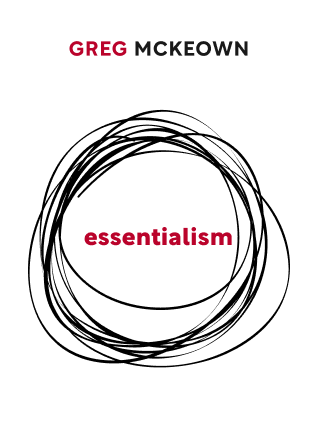

This article is an excerpt from the Shortform book guide to "Essentialism" by Greg McKeown. Shortform has the world's best summaries and analyses of books you should be reading.
Like this article? Sign up for a free trial here .
What is the central premise of Essentialism by Greg McKeown? What does he mean by “the disciplined pursuit of less?”
In his book Essentialism, Greg McKeown makes a compelling case for the disciplined pursuit of less (but better). It is a lifestyle philosophy that is premised on pursuing only things that are at the core of your identity (the essentials) and disregarding the rest (the nonessentials).
Keep reading for more about Greg McKeown’s lifestyle philosophy of essentialism.
Greg McKeown on Essentialism
Essentialism is Greg McKeown’s philosophy of pursuing less but better, in all aspects of your life. It’s not about being more efficient or doing more with less (or less with less), as many companies demand of employees. It requires stopping regularly to ask yourself, “Am I spending my time and resources on the right things?”
We have numerous activities and opportunities to choose from, and obviously, we can’t invest our time and energy in all of them. Some may be good or excellent opportunities, but most are inconsequential; few are crucial or essential. Essentialism is differentiating among the options and selecting and acting on just a few essential ones while eliminating the rest. It’s doing the right things as opposed to doing more things. Here’s how essentialism compares to the way most people function (nonessentialism):
Essentialism: Less but Better
- You focus on just a few important things, so you’re headed in one clear direction.
- You make significant progress on those things.
- You function by design rather than by default.
- You make tough trade-offs between what you do and don’t do, but these one-time decisions set you on a path that keeps you from having to make the same types of decisions repeatedly.
- Once you determine what’s essential, you remove obstacles so that achieving the essentials becomes routine.
- You say things like: “I choose to. Is it essential? What are the trade-offs?”
- You stop and ask yourself what matters most.
- You say no to everything nonessential.
- You remove hurdles so projects develop their own momentum.
Results: You do outstanding work, get the right things done, and feel in control and energized.
Nonessentialism: All Things to All People
- You try to do many things at the same time, so you’re going in multiple directions. Because you’re not making choices, others make choices for you and you function by default.
- You flail and make only minuscule progress in multiple activities.
- You say things like: “I have to do it. I can do both. I can do it all.”
- You react to the immediate and most urgent.
- You say yes to virtually everything.
- You “muscle” or force projects through to completion.
Results: You do too many things, none of them well; you feel out of control, overwhelmed, and exhausted.
Circumstances and people around us conspire against any efforts to choose and do the few most important things well. In his book Essentialism, Greg McKeown explains how to push back and put the “way of the essentialist” into practice in the workplace and in life.
To illustrate the philosophy of essentialism, Greg McKeown contrasts it with the way most people live their lives using two examples:
Example One: Opting Out of the Insanity
Sam Elliot (a fictional name) is a busy Silicon Valley executive who said yes to everything his bosses and colleagues asked of him and soon found himself being run ragged. Not only that, he became increasingly dissatisfied with his work, feeling that he spent most of his time on things that didn’t move the needle. His performance slipped and he seriously considered quitting and becoming a consultant until a mentor advised him to just do the things he would do as a consultant and nothing else.
He began gauging requests by whether he had the time and resources to fulfill them, and he started to say no. When people seemed to respect that, he tightened his criteria even more by considering whether the request was the most important thing he could do with his time at that moment. He stopped attending many meetings and got involved in fewer email debates. He concentrated instead on a few high-value projects. His momentum and quality of work grew, along with his satisfaction. His performance ratings went up and he received a large bonus.
Example Two: Choosing the Trivial Over the Important
By contrast, author of Essentialism Greg McKeown said yes to business demands when he should have said no. While at the hospital with his wife, who had given birth to their daughter the day before, he found himself answering emails and calls from work. A colleague requested that he come to a client meeting, and he left his wife and newborn to attend, thinking the client would respect him for his sacrifice. But he felt terrible about it and the client seemed to think less of him for leaving his family. The meeting turned out to be unimportant. The key lesson he learned: if you don’t set priorities for your life, others will inject their own.
What’s at Your Core?
According to Greg McKeown, essentialism is cumulative—the more you practice making essentialist choices, the more automatic it becomes. Over time, you internalize the way of the essentialist—it becomes something you are, not something you do. But ultimately, essentialism is what you make out of it. It can be something you add to your overcommitted life or it can be a different lifestyle, a simpler way of doing everything.
People with essentialism at their core get much more from their investment than those who apply essentialism occasionally. Yet, essentialism isn’t only about success — making your highest-level contribution — but also about living a meaningful life.

———End of Preview———
Like what you just read? Read the rest of the world's best book summary and analysis of Greg McKeown's "Essentialism" at Shortform .
Here's what you'll find in our full Essentialism summary :
- How to do less but to do it better
- Why you need to be disciplined in your pursuit of less
- How you can learn to say no






